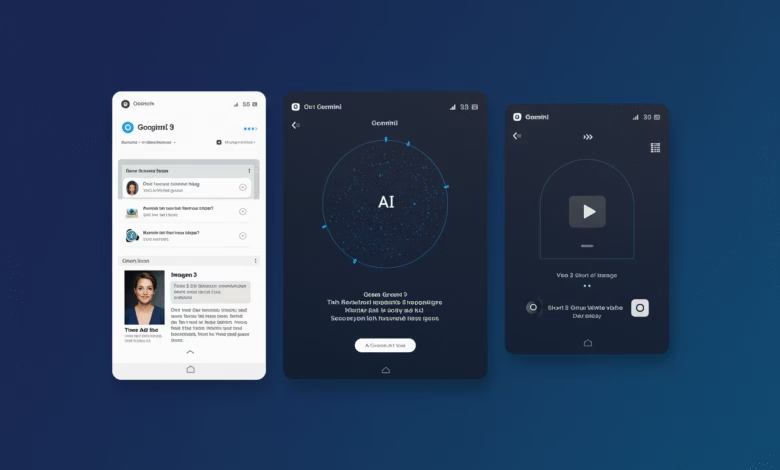Google’s Quiet Comeback: How AI Overview and Gemini Are Redefining Search

▼ Summary
– Google introduces AI Overviews and “AI Mode” powered by Gemini 2.0/2.5, enabling conversational, multi-part query handling in Search.
– Enterprise data privacy is prioritized, with Workspace content isolated and not used for public AI training without explicit consent.
– Gemini, Google’s multimodal AI, replaces Google Assistant and integrates into Chrome for real-time, context-aware interactions.
– Imagen 3 (text-to-image) and Veo 2 (text-to-video) offer advanced creative tools for generating high-quality visuals and 4K clips.
– Google’s AI upgrades focus on practical, integrated applications in Search, productivity, and creativity while ensuring enterprise-grade privacy.
Google is rolling out a wave of AI-driven features to reclaim its lead in search. Last month’s I/O announcements showed AI Overviews and a new “AI Mode” using Google’s latest Gemini models to make search more conversational and powerful. For example, AI Overviews now run on a Gemini 2.0 back end that handles tougher queries (coding, advanced math, images, etc.) with faster, higher-quality summaries.
At the same time Google is testing AI Mode – a new search tab where users ask complex, multi-part questions and get AI-generated answers with follow-ups. AI Mode breaks queries into sub-topics, issues multiple searches in parallel, and then merges the results into one coherent response. In practice this means asking Google hard questions (like comparing technical products or exploring a new concept) feels more like a dialogue: the custom Gemini 2.0/2.5 models can “think” through answers, link out to relevant pages, and let you dig deeper. Google promises these new modes will roll out gradually (US first) and that advanced features from “AI Mode” will be folded into regular Search based on user feedback.
Balancing Power with Privacy for Businesses
Crucially, Google says these AI upgrades won’t compromise data privacy, a key concern for business users. Google emphasizes that enterprise data stays isolated: Workspace content “stays in Workspace” and is not used to train Google’s public AI models without explicit permission. In other words, a private company report or trade-secret query on a Workspace account won’t be fed into Bard or Search training by default.
Google’s Enterprise Gemini for Workspace likewise offers “enterprise-grade” protections: teams can use Gemini chat at work “with confidence that their interactions can be kept private”. The company’s broader AI policy reinforces this; Google Cloud now plainly states “customer data is never used by Google” to train models without an opt-in. In short, businesses exploring Google’s AI-powered search can rest assured that sensitive queries and documents aren’t leaking into Google’s public training data.
Gemini at the Core: Multimodal AI Everywhere
Underpinning all of this is Gemini, Google’s family of multimodal AI models. Google describes Gemini as a general-purpose AI that can handle text, audio, images and more. In practical terms, Gemini is being woven into everything from Search to assistants. On the phone, Gemini replaces the old Google Assistant with a more conversational helper that users can “talk or write to… just like you would to a personal assistant”. In the desktop browser, a new “Gemini in Chrome” feature lets you click an icon and ask Gemini to summarize or explain the content of the current page. Under the hood, these services call a cloud-based Gemini model (Ultra, Pro or Nano, depending on task) to generate answers.
Early testing suggests Gemini already outperforms humans on some benchmark tests, giving Google confidence it can power useful, natural interactions. Because Gemini understands context, images and even audio, Google plans to use it to make Search and other apps more intuitive – for example, letting you talk back-and-forth with your camera view in a “Search Live” mode to solve problems in real time.
Beyond Text: Imagen and Veo for Creative AI
Google isn’t stopping at text. Its latest generative AI tools now include Imagen and Veo for visuals and video. Imagen 3 (an updated text-to-image model) creates “brighter, better composed images” in a variety of styles, and it’s already powering Google’s ImageFX lab tool. Likewise, Veo 2 (the video model) can produce high-quality short videos with cinematic effects: it understands camera angles, lighting and motion, even generating up to 4K clips that look surprisingly realistic.
Google has funneled these models into hands-on products: creators can go to the Google Labs site and use ImageFX or VideoFX (and a new “Whisk” tool) to generate and fine-tune content from simple text or image prompts. For instance, YouTube creators are already experimenting with AI-generated video backgrounds for Shorts, and businesses are using Vertex AI to integrate Imagen into design workflows. The emphasis is on making the technology useful, not gimmicky, templates like ImageFX let you iterate on a concept, and eventual commercial APIs mean developers can plug Gemini, Imagen or Veo into real apps and services.
Google’s updated AI ecosystem, from smarter search to creative studios, is aimed at keeping people productive without gimmicks. By coupling the new AI Overviews and AI Mode with clear privacy commitments for enterprise data, Google is trying to show that the next chapter of search can be both powerful and safe. Gemini-driven features in search, assistant and Chrome bring a more natural, conversational AI experience, while Imagen and Veo let users generate images and video in straightforward ways. Together, these moves suggest Google is leveraging its global scale and deep research to deliver AI that feels integrated and useful – not just flashy – in day-to-day search and work.
Sources: Google product announcements and blogs.



